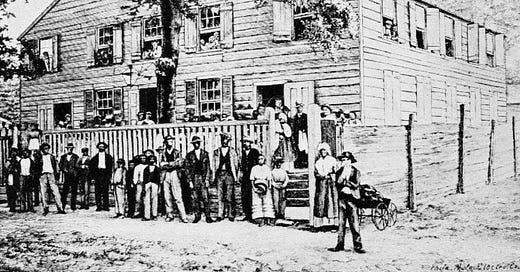Above: Silver Bluff Baptist Church, one of the first black churches in America, which David George helped to found. No known images exist of David George.
In 1792, two English Particular Baptist pastors, John Rippon (1751–1736) and Samuel Pearce (1766–1799), sat down in London with an African-American Baptist, David George (1743–1810), as he narrated to them the story of his conversion and his call to ministry. Some, though not all, of his story, would have sounded quite familiar to Rippon and Pearce, especially the way that George came to see himself as a sinner.
When George was told by an acquaintance that if he continued to live as he did, he would “never see the face of God in glory,” he experienced such conviction of sin that he was certain that he “must go to hell.” As George put it, “I saw myself a mass of sin.”[1] As he went on relating his story to the two English Baptists: “I could not read, and had no Scriptures. I did not think of Adam and Eve’s sin, but I was sin. I felt my own plague; and … that my sins had crucified Christ.”[2]
The great spiritual battle for these three Baptists, as for Anglophone evangelicals in general in the 18th century, was not the struggle against the Roman Church and the fastest-growing form of heterodoxy in that era, namely, Socinianism. To be sure, they knew that they had speak to the doctrinal aberrations in these movements. But as their contemporary John Newton (1725-1807) once put it: the real pope who scared him was not the Man in Rome, but the old Adam indwelling his very frame.
The English-speaking evangelicals of the 18th century perceived a truth that conservative evangelicals on this continent, as well as so-called progressive evangelicals and liberal professing Christians, seem to have forgotten: our great spiritual battle is not the so-called culture war not is it the current political fray that seems to have usurped the thoughts of conservative and liberal alike (both seem to believe that everything is political, an idea that used to be the province of the authoritarians on the left and on the right).
Rather, it is the battle against indwelling sin. Of course, so-called social justice warriors and their opponents casually (and wrongly) dismiss this with a word that has become a swear word for so many who should know better, namely, “pietism.”
But if one does not personally triumph in the battle aginst the Quisling sin, what matter all the victories in our culture wars?
[1] It is intriguing to note that this phrase “mass of sin (massa peccati)” is ultimately Augustinian. See Augustine, Miscellany of Questions in Response to Simplicianus 2.16.
[2] David George, “An Account of the life of Mr. David George, from Sierra Leone in Africa; given by himself in a Conversation with Brother Rippon of London, and Brother Pearce of Birmingham” in Joanna Brooks and John Saillant, ed., “Face Zion Forward”: First Writers of the Black Atlantic, 1785–1798 (Boston, MA: Northeastern University Press, 2002), 180. For David George, see Grant Gordon, From Slavery to Freedom: The Life of David George, Pioneer Black Baptist Minister (Hantaport, NS: Lancelot Press for Acadia Divinity College and The Baptist Historical Committee of the United Baptist Convention of the Atlantic Provinces, 1992).




